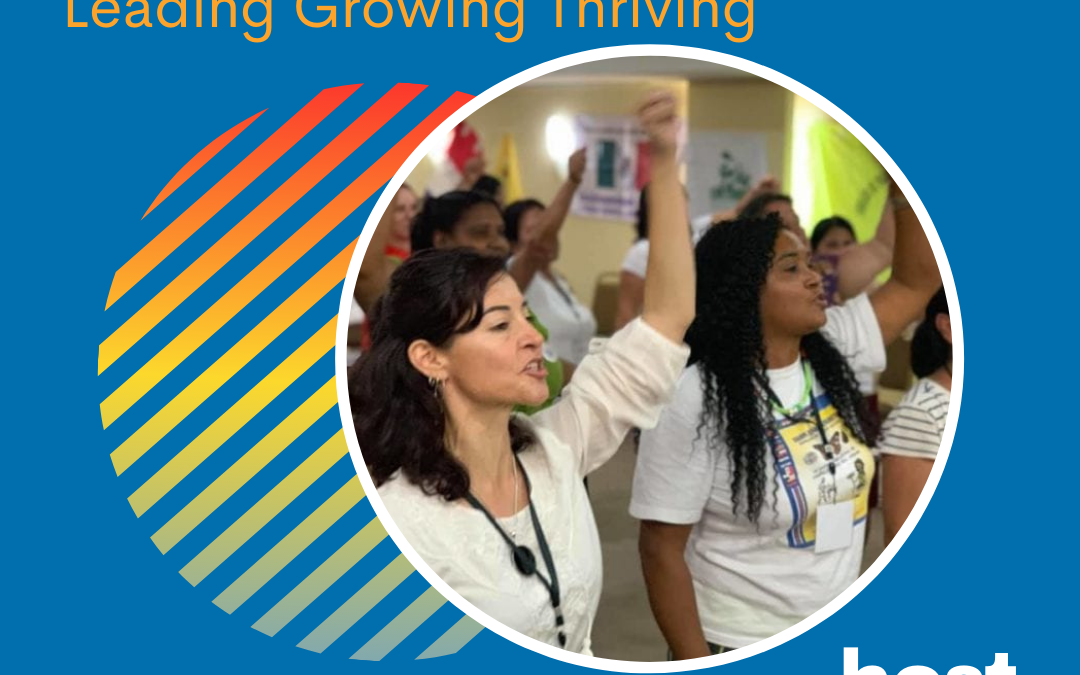
Apr 14, 2021
Domestic workers are among the most invisible workers in the world—yet in Latin America, they are joining together to champion their rights at their workplace and in their communities, says Adriana Paz Ramirez on this week’s episode of The Solidarity Center Podcast.
Paz, Latin American regional coordinator for the International Domestic Workers Federation (IDWF), says these mostly Black and Indigenous women are breaking decades of intergenerational oppression and trauma, and forging new paths through holistic leadership training, creating community-wide social movements and expanding their strength by connecting with each other.
Within six months of a recent leadership training, for example, 9,000 new members signed up with 26 organizations, Paz tells host Shawna Bader-Blau, Solidarity Center executive director.
“I was so touched by a domestic worker leader who said that I have not been able to give my daughter an inheritance, like money or a house, but I’m giving her this movement. Because this is changing our lives, because this is changing our countries, because this is changing history,” she says.
“That is the significance of getting themselves into a union. If the women at the bottom of the bottom are racing up, all of us are raising up.”
Listen Anytime to The Solidarity Center Podcast
The Solidarity Center Podcast, “Billions of Us, One Just Future,” highlights conversations with workers (and other smart people) worldwide shaping the workplace for the better.
Be sure to catch last week’s episode in which Bader-Blau talks with Francia Blanco, a trans rights activist, domestic worker and union leader in Nicaragua who is working with her union to achieve rights, respect and dignity on the job for all LGBTQ+ workers.
Look for final episode this season on April 21, with International Trade Union Confederation President Ayuba Wabba. He explores the Nigerian labor movement’s response to the COVID-19 crisis and discusses the global labor movement’s plans to build back better for workers around the world
And check out recent episodes:
• LGBTQ+ Domestic Workers Win Rights with Their Union
• Making the Gig Economy Work for Workers
• Winning Rights for Migrant Workers
• Defending Democracy: Workers on the Frontline
• Ending Gender-Based Violence at Work: The Campaign to Ratify ILO C190
This podcast was made possible by the generous support of the American people through the U.S. Agency for International Development (USAID) under Cooperative Agreement No.AID-OAA-L-16-00001 and the opinions expressed herein are those of the participant(s) and do not necessarily reflect the views of USAID/USG.
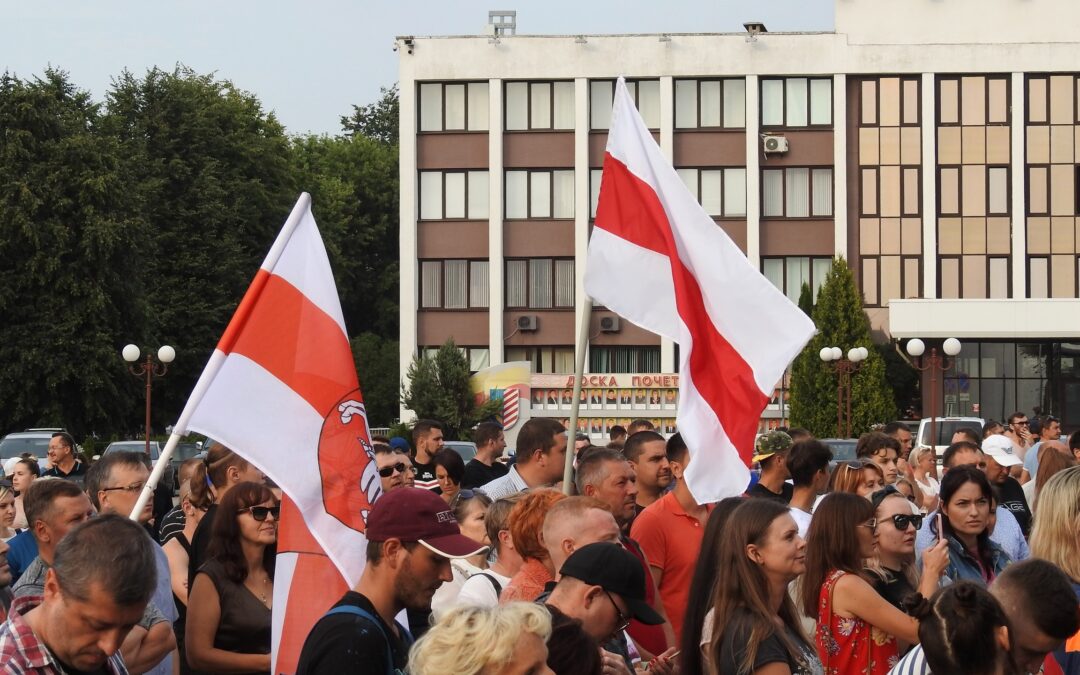
Apr 13, 2021
Three union leaders and a worker rights activist were arrested in Belarus, and the government is proposing a new law tightening restrictions on public gatherings as it ramps up repression against unions and their members who are demanding free and fair elections and democratic freedoms like the right to form unions.
Anna Kalupakho, Sergei Lapunov and Andrei Schkirenko of the Belarusian Independent Trade Union (BDP) were arrested in recent days, along with Aleksandr Kashpul, an activist at JSC “Naftan,” an oil refinery and petrochemical complex where workers went on strike.
They say they were given no reason for their arrest.
Four striking Naftan workers also are on trial, along with Kalupakho, a strike committee member at the Belarus metallurgical plant in Zhlobino, union leaders say. (Support Naftan workers here.)
Police also came to the local union’s office at Naftan, questioning staff about official permits for the union premises. Since then, several police members have patrolled the building, according to union leaders.
“At the moment, we are experiencing an escalation of tensions on the part of the Belarusian government,” says a leader of the independent union movement. “A sharp turn for the worst has occurred at JSC Naftan. The enterprise administration uses the police and the prosecutor’s office to pressure the striking workers and force them to quit,” he says.
Government Seeking to Further Restrict Freedom to Gather
The government is now seeking to amend the country’s public demonstration law to legally permit employers to fire, without prior union consent, anyone arrested for participating in a protest event. Proposed amendments also would allow unions to be punished if any of their members participate in a public demonstration that has not received prior approval from government authorities.
“The above changes in the legislation heavily aggravate the already depressing situation with workers and trade unions rights in Belarus,” writes Aliaksandr Yarashuk, BKDP president, in a letter to the International Labor Organization (ILO), which is part of the United Nations. “They allow the government to violate grossly and shamelessly the norms of the fundamental ILO Conventions.”
(Siarhei Antusevich, BKDP vice president, describes workers’ ongoing struggle for democracy in conversation with Solidarity Center Executive Director Shawna Bader-Blau at The Solidarity Center Podcast. Listen here.)
Belarus Independent Unions Win International Prize
The Belarusian Congress of Democratic Trade Unions (BDKP) and its three affiliates, BDP, the Free Metal Workers’ Union (SPM) and Belarusian Radio and Electronic Industry Workers’ Union (REP) last week were awarded the 2021 Arthur Svensson international prize for trade union rights for their fearless struggle for democracy and union rights.
“The independent trade union movement has been central in the fight against the falsification of election result and the fight for democracy,” says Frode Alfheim, president of the Norwegian Industri Energi union, which established the prize to promote and strengthen trade unions and trade union rights internationally.
Workers at factories across Belarus have been fired and sometimes arrested for taking part in pro-democracy rallies. For instance, at the Belarus Metallurgical Plant (BMZ), where workers went on strike in August, four workers were sentenced to more than two years in prison for the “organization of actions in gross violation of public order” in February, and the conviction was upheld in March. Many other strike participants and strike committee activists have been fired and the state-controlled courts have refused to reinstate them, according to union leaders. (Support BMZ workers here.)
Workers at other plants, who took part in an October national day of action in support of The People’s Ultimatum, have been fired and some imprisoned, including workers at the Grodno Azot plant. Thirteen fired employees at Grodno Azot plant have submitted a collective appeal, demanding reinstatement and calling out their dismissal as unjustified. (Support the Grodno Azot workers here.)
Global Condemnation for Attacks on Workers
The ILO issued a report in late March reinforcing documentation by the International Trade Union Confederation (ITUC) on widespread arrests, prosecution and firing of workers engaged in strikes and pro-democracy rallies in Belarus, and government repression of basic civic freedoms, such as forming unions, bargaining collectively and striking.
Among other recommendations, the ILO “urges the government to investigate without delay the alleged instances of intimidation or physical violence through an independent judicial inquiry, in order to shed light on the facts and circumstances surrounding these acts, and to identify those responsible, punish the guilty parties and thus prevent the repetition of similar event.”
In August 2020, hundreds of thousands of people, often led by union members, many of them women, took to the streets to protest elections in which President Alexander Lukashenko declared himself winner in a landslide victory amid widespread allegations of fraud. Popular opposition candidate, Sviatlana Tsikhanouskaya, was forced into exile, and the government has since arrested at least 30,000 thousand protestors, often torturing them in prison, and an unknown number have been killed.
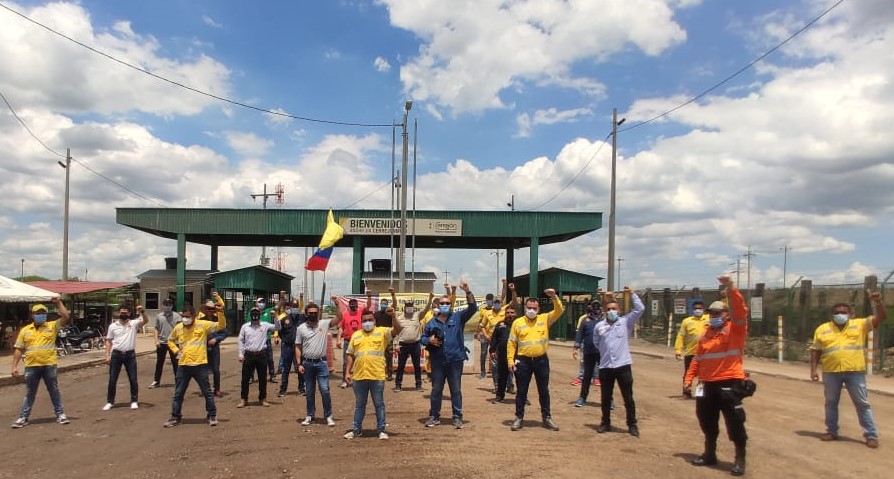
Apr 7, 2021
Organizations representing Colombia’s energy and mining sector workers are supporting the country’s transition to cleaner energy while preserving decades-long, hard-fought progress in turning often unsafe and poorly paid jobs into safer, family-sustaining livelihoods.
A joint declaration signed late last year formalizes the commitment of Colombia’s national labor federation Central Unitaria de Trabajadores–CUT and three of its largest mining- and energy-sector unions—Sintracarbón, Sintraelecol and Unión Sindical Obrera (USO)—to an urgent national effort to abandon fossil fuels and adopt new technologies, assuming those policies prioritize:
- National policies that support full compliance with Paris Agreement goals
- Government oversite of such policies, including all climate interventions implemented by private mining and energy companies in Colombia
- The preservation and strengthening of decent work in mining and energy sectors, and of their unions.
“Colombian energy- and mining-sector workers—and the communities they sustain—must participate in every step of the process to ensure workers’ rights to safety and good jobs are supported by the country’s energy transition policies,” says Carlos Guarnizo, Solidarity Center Colombia-based program coordinator.
“Transition to a new energy agenda should be negotiated with us and the rest of society,” to ensure a fair and democratic model of energy production, says the declaration. Energy- and mining-sector workers should be consulted because they have the knowledge and experience to conceive, propose and advance the discussions that will shape the policies on transition to clean energies. Declaration signatories will be working in coalition with one another, as well as with academics, social and environmental justice movements and the international community, to devise such a model.
“On Earth Day, the Solidarity Center stands with Colombian energy- and extractive-sector unions—and all others around the world—as they drive the vision for a fair or just transition to a cleaner, more inclusive, and more equitable economy,” says Sonia Mistry, Solidarity Center global lead on climate change and just transition.
The Intergovernmental Panel on Climate Change (IPCC) found that emissions from fossil fuels are the dominant cause of global warming. Carbon dioxide emissions increased by almost 90 percent from 1970 through 2011, with emissions from fossil fuel combustion and industrial processes contributing almost 80 percent of that increase. About 50 percent of Colombia’s electrical-generation capacity is in the hands of privately owned companies.
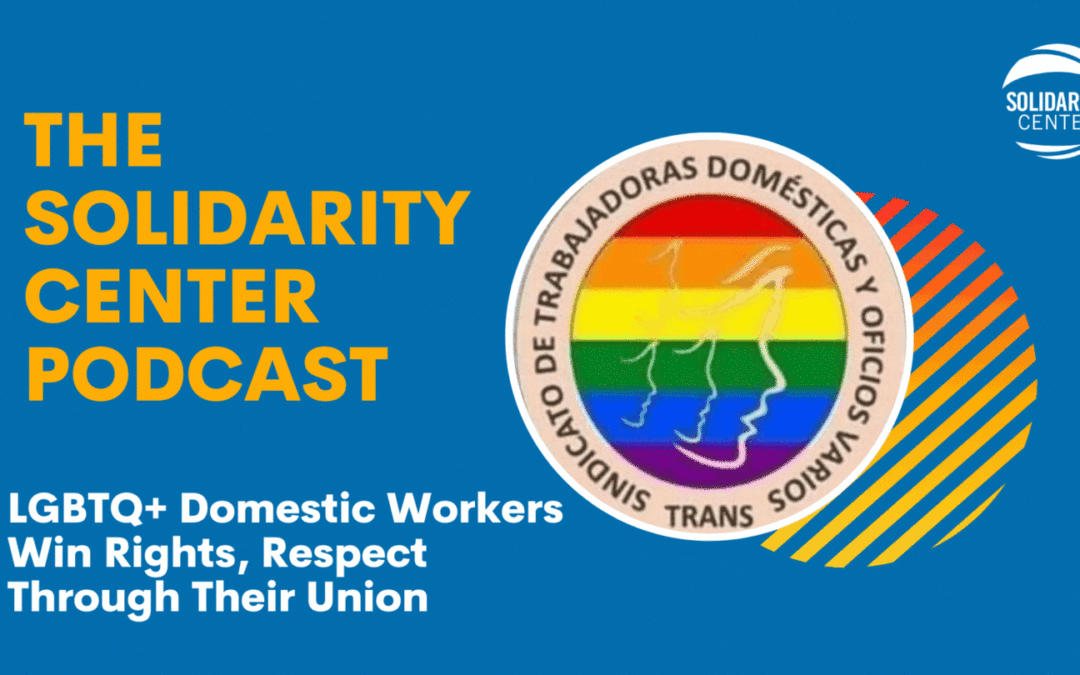
Apr 7, 2021
As a trans domestic worker from Nicaragua working in Guatemala, Francia Blanco says her experiences with verbal and physical abuse, discrimination, and forced labor conditions led her to take action to build a world where trans domestic workers had rights, respect and dignity on the job. And, back in Nicaragua, that’s exactly what she and her co-workers are doing through SITRADOVTRANS, a union of trans domestic workers that is breaking barriers in the labor movement and beyond.
“We all know that at times, results can be slow to appear but we always are training up more of our members to not only learn more themselves but also find more women in the community who want to be part of this process,” she says.
“And it’s an ongoing process because you know we live in a globalized world and things are always changing so this is not something that can stop, we always have to be moving with it.”
Blanco spoke with Solidarity Center Executive Director Shawna Bader-Blau in this week’s episode of The Solidarity Center Podcast.
Blanco’s union is a member of FETRADOMOV, the federation of domestic workers in Nicaragua.
“For us as a trans union, it is very important to affiliate with unions on the national level. We have more support when we are in greater numbers. And also, we are domestic workers. Most trans women see domestic work as one of the few options they have access to.”
Listen Anytime to The Solidarity Center Podcast!
The Solidarity Center Podcast, “Billions of Us, One Just Future,” highlights conversations with workers (and other smart people) worldwide shaping the workplace for the better.
Look for upcoming episodes, including:
April 14: Adriana Paz, an advocate with the International Domestic Workers Federation who understands firsthand the power of unions in ensuring domestic workers have safe, decent jobs
April 21: International Trade Union Confederation President Ayuba Wabba, who explores the Nigerian labor movement’s response to the COVID crisis on workers and discusses the global labor movement’s plans to build back better for workers around the world
And check out recent episodes:
- Winning Rights for Migrant Workers
- Defending Democracy: Workers on the Frontline
- Ending Gender-Based Violence at Work: The Campaign to Ratify ILO C190
This podcast was made possible by the generous support of the American people through the U.S. Agency for International Development (USAID) under Cooperative Agreement No.AID-OAA-L-16-00001 and the opinions expressed herein are those of the participant(s) and do not necessarily reflect the views of USAID/USG.
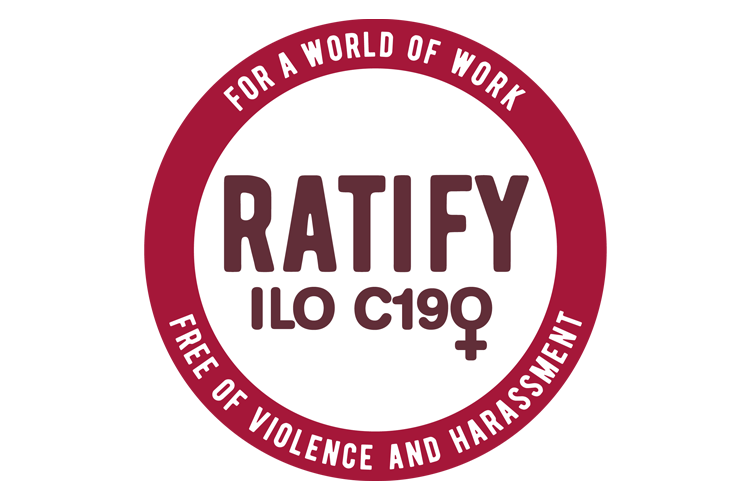
Apr 5, 2021
Union women and Solidarity Center partners from the Middle East and North Africa spearheaded a petition calling for governments to ratify International Labor Organization Convention 190, the landmark global labor standard adopted in June 2019 to eliminate violence and harassment in the world of work, including gender-based violence and harassment (GBVH).
“The idea of starting a petition arose during the seminar we held as a collective, ‘Women for the Dignity and Rights of Women’ [where] women from different Arab countries presented their efforts to get their countries to ratify Convention 190,” says Touriya Lahrech, president of the Morocco Contributions Forum, a Solidarity Center partner.
Unions and civil society organizations launched the petition in conjunction with the United Nations Commission on the Status of Women meetings and the Generation Equality Forum in March. Activists from Bahrain, Egypt, Iraq, Jordan, Kuwait, Lebanon, Morocco, Tunisia and Yemen who comprise the Coalition for Women’s Rights and Dignity coordinated with the International Trade Union Confederation (ITUC) to host the online petition.
The petition is available in Arabic, English, French and Spanish.
Mar 31, 2021
Like gig economy workers around the world, delivery drivers in Ukraine “have zero labor rights,” says worker rights attorney George Sandul. And, during the COVID-19 pandemic, “the drivers were on the front line of this struggle without any personal protective equipment, without any guarantees. And in case they will catch COVID, nobody will pay any compensation for them.”
Sandul spoke with Solidarity Center Executive Director Shawna Bader-Blau, host of The Solidarity Center Podcast, where he shared how unions in Ukraine are engaged in creative campaigns to reach these vulnerable workers. At the same, it is necessary to educate the public, he says.
“The first step to solve this problem is to raise awareness about this problem because, in fact, the ordinary customer perceives that the gig economy is something that simplifies his or her life.”
The future of work must not be one where employers do not take responsibility for their workers, Sandul says.
“To change the power balance, unions are the crucial for democracy development in Ukraine because without controlling the big corporations of the state, we will get dictatorship of the big companies.”
Tune in to today’s show and join us for a new episode each Wednesday for a new episode each on iTunes, Spotify, Amazon, Stitcher or wherever you subscribe to your podcasts.
(Check out Taken for a Ride: Litigating the Digital Platform Model, an issue brief by the International Lawyers Assisting Workers Network (ILAW).
Billions of Us, One Just Future
The Solidarity Center Podcast, “Billions of Us, One Just Future,” highlights conversations with workers (and other smart people) worldwide shaping the workplace for the better.
Be sure to catch last week’s episode in which Bader-Blau talks with migrant rights advocates attorney Preeda, who discusses how union are helping migrant workers gain rights in Thailand.
SOLIDARITY CENTER PODCAST SCHEDULE
- April 7: Francia Blanco, a domestic worker and trans rights activist reaching marginalized workers through her all-trans domestic workers union
- April 14: Adriana Paz, an advocate with the International Domestic Workers Federation who understands firsthand the power of unions in ensuring domestic workers have safe, decent jobs
- April 21: International Trade Union Confederation President Ayuba Wabba, who explores the Nigerian labor movement’s response to the COVID crisis on workers and discusses the global labor movement’s plans to build back better for workers around the world
This podcast was made possible by the generous support of the American people through the U.S. Agency for International Development (USAID) under Cooperative Agreement No.AID-OAA-L-16-00001 and the opinions expressed herein are those of the participant(s) and do not necessarily reflect the views of USAID/USG.





